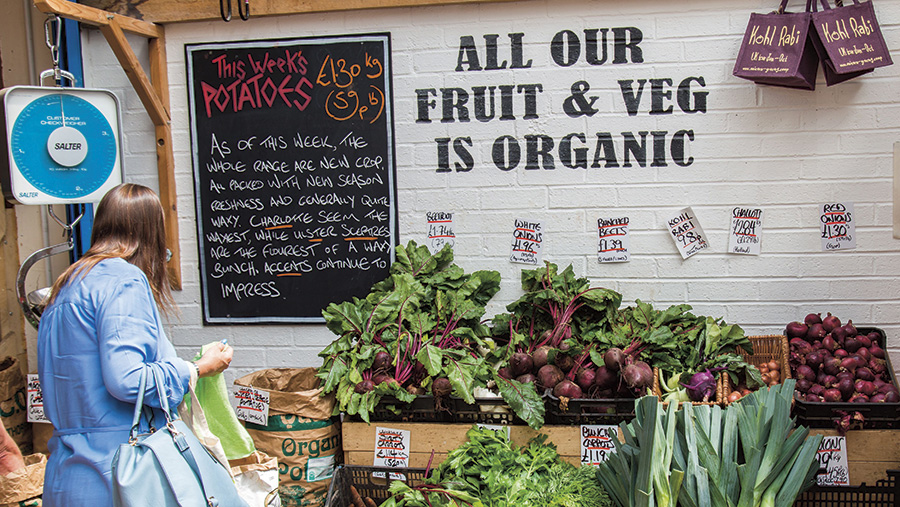Coronavirus: Sharp uptick in sales of organic produce
 © David Pearson/Rex/Shutterstock
© David Pearson/Rex/Shutterstock The premium organic sector should shrug off the impact of coronavirus as growing numbers of consumers look for greater reassurance on food sources in the wake of the pandemic, the Soil Association has said.
The certification body said sales through processors supplying supermarkets increased by 25.6% in March, and the market still looks set to surpass its target of £2.5bn in sales by the end of the year.
The news comes despite concerns in some quarters that the sector may be under threat if consumers tighten their belts as the economy dips into recession, with the amount of organic land still well below where it was prior to the 2008 financial crash.
See also: Coronavirus loan scheme: What farmers need to know
Figures published by Defra this week show 485,000ha of UK farmland were under organic production in 2019 – a rise of 2.4% on the previous 12 months.
Of that increase, 3.6% was in land coming into full organic status which offset a 14.7% fall in the area still in conversion. Areas stand at 457,000ha for fully organic land and 28,000ha in conversion. However, overall, the area remains well short of the 2009 peak when about 750,000ha were farmed organically.
Broken down, most of the organically farmed area (63%) was in permanent pasture, with temporary grassland accounting for 20% and arable use at 8%. Land use for cropping showed an increase between 2018 and 2019. The cereals area rose by 7.2% from 37,000ha in 2018 to 39,700ha in 2019.
Livestock
Despite a sharp rise in land down to permanent pasture from 61,800ha in 2018 to 95,100ha (+53.9%) the organic red meat sector declined over the 2018/2019 period.
Sheep reared organically decreased by 5.4% to 782,000 animals in 2019, while pig numbers fell by 9.3% from 37,000 head in 2018 to 34,000 head in 2019.
Cattle numbers also fell from 324,000 head in 2018 to 301,000 head in 2019, a decrease of 7.2%.
The figures relate to a period before the impact of Covid-19 on the premium market and any knock-on effect on farmer decisions to convert.
Dairy
The Defra statistics do not cover milk production, but Richard Hampton, managing director for organic milk suppliers co-op Omsco, reported that the dairy sector remained stable overall.
During the coronavirus pandemic, organic dairy production has seen a similar picture to conventional production, he said.
“Food service sector suppliers have found trading conditions difficult in contrast to their counterparts on the retail side.
“So we are seeing a neutral position regarding coronavirus overall. But it remains to be seen what the long-term effect will be if the pandemic causes a sustained recession,” he said.
Collapse of Australian co-op
The stable UK picture is in stark contrast to events in Australia where the largest organic dairy co-op has collapsed.
Organic Dairy Farmers of Australia has been put into receivership by its directors, who blamed a downturn in the Chinese market and the impact of Covid-19 on the premium sector.
The collapse has left creditors and its 40 farmer owners owed millions of dollars.
Administrators have suggested the company owes National Australia Bank AUD$8m (£4.3m) and unsecured creditors, like farmers, between AUD$3.5m (£1.9m) and AUD$5m (£2.7m).
